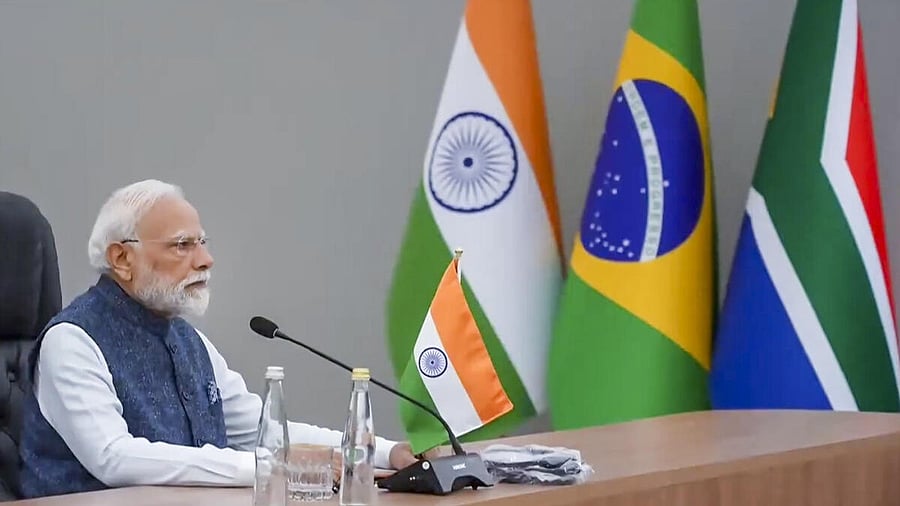
Prime Minister Narendra Modi during IBSA Leaders' meeting, on the sidelines of the G20 Summit, in Johannesburg, South Africa.
Credit: YouTube@NarendraModi via PTI Photo
New Delhi: Prime Minister Narendra Modi on Sunday stressed the need for a global governance architecture to prevent the misuse of Artificial Intelligence, notwithstanding strong opposition from the United States President Donald Trump’s administration to any move for international oversight over the technology.
“We must all ensure that AI is used for the global good and that its misuse is prevented. For this, we need a global compact on AI, built upon certain fundamental principles,” Modi said at the G20 summit in Johannesburg, South Africa. “These should include effective human oversight, safety-by-design, transparency, and strict prohibitions on the use of AI for deepfakes, crime, and terrorist activities,” he added, suggesting the foundational principles of the proposed global compact on AI.
The prime minister was speaking at the third session of the G20 summit – themed on “A Fair and Just Future for All – Critical Minerals; Decent Work; Artificial Intelligence”.
Trump boycotted the 20th G20 summit hosted by President Cyril Ramaphosa of South Africa in Johannesburg. The US president stayed away from the summit, alleging persecution of the white Afrikaners in South Africa.
“AI systems that impact human life, security, or public trust must be responsible and auditable,” Modi said on Sunday. “And, most importantly, while AI may enhance human capabilities, the ultimate responsibility for decision-making must always remain with human beings.”
Modi’s call for the Global Compact on AI went against the Trump Administration’s stand on the centralised governance of the new technology. The US already rejected “all efforts by international bodies to assert centralised control and global governance of AI”.
The US argued that excessive regulation could kill the transformative sector, and safety concerns should not stymie the growth of AI.
“India’s approach to AI is anchored on three pillars – equitable access, population-scale skilling, and responsible deployment,” the prime minister said at the G20 summit on Sunday. “Under the India-AI Mission, we are developing accessible high-performance computing so that the benefits of AI reach every district and every language,” he said, adding: “This will provide both scale and speed to our efforts toward human development.”
The prime minister said that his government would host the AI Impact Summit in New Delhi in February 2026, with the theme: “Sarvajana Hitaya, Sarvajana Sukhaya” – welfare for all, happiness for all. He invited all G20 nations to participate in the summit.
Chinese President Xi Jinping also recently said that a World Artificial Intelligence Cooperation Organisation could set governance rules and boost cooperation, making AI a public good for the international community.
Modi on Sunday also argued for a swift shift in approach from the “jobs of today” to the ‘capabilities of tomorrow’. “Unlocking talent mobility is essential for rapid innovation,” the prime minister said, adding: “We hope that in the coming years, the G20 will develop a global framework for talent mobility.”
